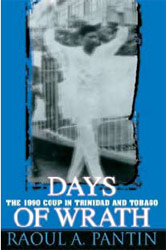|
April - May 2008

Issue Home >>
|

A Slice of History
Pantin’s style can easily be described as cinematic, so alive and
detailed the writing, not surprising since he also wrote the screenplay
for the movie Bim, long regarded as a classic by critics.
by Margaret Walcott
On Friday 27th July 1990 Raoul Pantin a Trinidadian journalist of high
repute was editing material for the evening tele-cast when he was
disturbed by noises in the corridor of Trinidad and Tobago Television
building.
The disturbance, unbelievably, was caused by an armed invasion of the
country’s lone television station by a small group of fundamentalist
Muslims known as the Jamaat al Muslimeen
The coup lasted 6 days and In Days of Wrath – the 1990 Coup in Trinidad
and Tobago Pantin, himself a hostage in the television station recalls
the terror of those days. A real page-turner, the slim 163 page book
reads like a thriller which in one sense it is, albeit a true one.
Pantin’s style can easily be described as cinematic, so alive and
detailed the writing, not surprising since he also wrote the screenplay
for the movie Bim, long regarded as a classic by critics.
The coup, we are told was “a planned, probably rehearsed, coordinated,
synchronized lightning strike, they (the Muslimeen) had launched an
armed assault on a sitting of the regular Friday afternoon meeting of
the House of Representatives – shot to death the lone security policeman
at police headquarters on adjoining St. Vincent Street, exploded a car
bomb that set the entire headquarters on fire, taken over both [Trinidad
and Tobago Television] TTT and its neighbouring Radio Trinidad”.
Beyond these Days of Wrath, Pantin effectively conveys the zeitgeist,
suggesting how social and historical factors created the strained
economic situation in the country: the unpopularity of the Prime
Minister , the unstable politicial scenario, conditions conducive to the
emergence of the Muslimeen and its leader Abu Bakr.
The attempted coup only lasted a few hours and by the end of that day,
Friday 27th July, Abu Bakr and his band of 114 gunmen, in the words of
the author, were ”dead men walking”. Pantin explains that although the
Muslimeen were always aware that they were outnumbered by the police and
the regiment, Abu Bakr had erroneously anticipated the support of the
people, (they only went on a looting spree) and of the armed forces
(they, in the words of the Prime Minister, “attacked with full force”).
Indeed the terror of the coup increased as the days progressed and many
conflicting initiatives were tried.
The hostages grew more fearful, informed and misinformed by a very
active grapevine that somehow brought news to the gunmen and the
hostages. There was talk of a surrender being negotiated; of the
granting of an amnesty; of various important persons coming to
negotiate; and as the hopes of the hostages went up and down, there was
the unwavering determination of the army to overpower by sheer force and
capture the insurgents. Pantin skillfully conveys the tension in T&T in
those roller coaster days and his concern for the safety of the
sixty-nine hostages.
As one would expect from Pantin, the journalist, the humour and irony of
the situation is highlighted.
The image of Bakr using his AK-47 rifle as a microphone singing along
with a popular calypso on the radio joined by two or three other gunmen
one of them using his rifle butt as a drum and the other strumming an
imaginary guitar. The calypso is Sniper’s Portrait of Trinidad –
“Trinidad is my land and to love it I am proud and glad”; Bakr inviting
the hostages to dinner at Mucurapo Road when they all get back home.
The young fundamentalist gunman asking Pantin, the hostage, to buy a TV
set, A video Set, A Washing Machine and a Fridge for his wife from the
profits of the book he will write about the coup.
More striking, and at times ellusive, are the writer’s constant
explanations of the characteristics of the Trinidadian. He seems to be
doing more than just clarifying the expressions and behaviour for the
foreign reader. Near the end of the book he writes, “In more ways than
one I believe even to this day, 17 years after the fact, that the vast
majority of the laid-back, fun-loving, party-going, creative,
Nine-Day-Wonder, Carnivalesque people of Trinidad and Tobago have little
or no idea what we really managed to elude in 1990”. He really seems to
be asking - How could this happen in T&T, how could we Trinidadians
behave in this way?
This seems to be Raoul Pantin’s dilemma and indeed that of the nation.
For the author it seems there is a constant need for recall, for the
facts to be laid bare and examined, or else the old, much beaten adage
‘Those who forget the past are doomed to repeat it” will remain an
imminent threat.
 Days
of Wrath : The 1990 coup in Trinidad and Tobago Days
of Wrath : The 1990 coup in Trinidad and Tobago
Raoul A. Pantin
iUniverse, Inc
Available at the UWI Bookshop |





